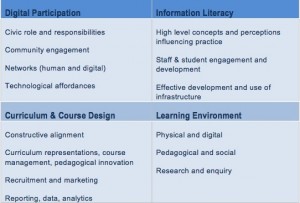Following our introductory post and our last post on Digital Participation, in this post we are going to explore the Information Literacy quadrant of our conceptual model.
To reiterate,the logic of our overall discussion starts with the macro concept of Digital Participation which provides the wider societal backdrop to educational development. Information Literacy enables digital participation and in educational institutions is supported by Learning Environments which are themselves constantly evolving. All of this has significant implications for Curriculum and Course Design.

MacNeill, Johnston Conceptual Matrix, 2012
Information Literacy
As we stated in our introductory post, our perspective is rooted in Information Literacy. We believe it is a key field to be deployed in developing digital infrastructure in universities. For our purposes Information Literacy can be described both narrowly, as a set of personal skills and approaches to better acquisition and use of information, and more broadly as a social construct arising from notions of the both the knowledge economy and information society.
In the broader perspective, UNESCO is in the vanguard of deploying the term in relation to media, citizenship and education by asserting Information Literacy as a key requirement of participation in learning, employment and democracy. The Alexandria Proclamation (2006) states that information literacy:
• comprises the competencies to recognize information needs and to locate, evaluate, apply and create information within cultural and social contexts;
• is crucial to the competitive advantage of individuals, enterprises (especially small and medium enterprises), regions and nations;
• provides the key to effective access, use and creation of content to support economic development, education, health and human services, and all other aspects of contemporary societies, and thereby provides the vital foundation for fulfilling the goals of the Millennium Declaration and the World Summit on the Information Society; and
• extends beyond current technologies to encompass learning, critical thinking and interpretative skills across professional boundaries and empowers individuals and communities.”
More practical information can also be found in Woody Horton’s Information Literacy Primer.
Whilst these concerns are driven by the growth of technologies and the internet, they are channelled by a need to expand our notions of literacy beyond the basics of reading/writing, to include media and information (UNESCO Decade of Literacy 2003-12).
Thus whilst technological change in the production and consumption of information content is a fundamental factor, it is not allowed to obscure the importance of developing the educational, ethical and democratic dimension of the digital society.
Personal Skills and Strategies of Information Literacy
Information Literacy is portrayed in terms of improving the information behaviours required to access and search various information systems to extract and use information for social, economic and educational purposes. This approach has been developed to a high level of definition and practical application in education, research and professional practice e.g. competency frameworks such as the SCOUNL Seven Pillars and ACRL and definitions by bodies such as CILIP .
There is a clear message that simply using information tools and services is insufficient to develop the full range of skills and also understanding of the legal/ethical issues involved. Education for Information Literacy is therefore a key aim, which requires further development, and has been gaining attention in HE for several decades.
These authors deal with the following key issues:
*Staff perception Webber and Johnston
*Student experience Lupton
*Course Design and assessment Bruce, Edwards, Lupton.
Clearly Information Literacy does not exist in a vacuum. For educational purposes the question of learning environment is essential, particularly with increasing use of digital environments, which inevitably stimulates a need to understand information and information behaviour more explicitly. This will be the topic of our next post.
Hello Sheila,
Bill told me about this last week. Hope blog attacts a lot of postings. Good summary of IL issues above. However my interests have been for quite some time more in non HE, workplace and informal learning and I am increasingly concerned about the relative disinterest among academics in an area which does actually take in the vast majority of the population. Academia – university students and staff and academic librarians seem to have a clear view about what is most important in IL R&D – themselves – time to turn the tanker round?
PS Mentioned blog to Christine but she is a bit busy.
John
Hi John
Got to catch up. Would be intersted on hearing more of your views on how we could join up the informal and formal sectors more?
Sheila
Point well made John, so look forward to some posts to expand the discussion of IL in workplaces etc. Worth bearing in mind that HE institutions are also workplaces, which I think sometimes gets forgotten in the concentration on IL as a teaching/learning concept. So, what about the IL experiences of lecturers, administrators etc?
All the best,
Bill.
Dear all,
Sorry about delay in replying. Was in London and then knocking together a PPT for LILAC. Suggestions might include:
Some universities have wider access programmes which might include contacts with schools and local welfare organisations and involvement in these is worth considering.
Secondly pupils in years 5-6 in local schools should be encouraged to use the university library for dissertation etc work. There has also been formal work in linking IL skills training between school and HE (e.g. Moira Bent at Newcastle). University librarians should work with local school librarians on possible joint programmes.
There is also the question of training of teachers. We will not have information literate school pupils until we have information literate teachers. Trainee teachers should receive IL training. Strathclyde U would be a good place to start. The Dept of Info Studies could offer training.
Best wishes
John
Hi John
Thanks for this, yes fostering more links with schools and using the library as a hub for this is definitely worth encouraging more. Yes staff training is crucial too, and to ensure that it develops and is encompassing to foster literate abilities.
Sheila